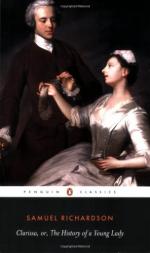The doctor had been with her, as well as Mr. Goddard; and they both joined with great earnestness to persuade her to have her house removed out of her sight; but she assured them that it gave her pleasure and spirits; and, being a necessary preparation, she wondered they should be surprised at it, when she had not any of her family about her, or any old acquaintance, on whose care and exactness in these punctilios, as she called them, she could rely.
The doctor told Mrs. Smith, that he believed she would hold out long enough for any of her friends to have notice of her state, and to see her; and hardly longer; and since he could not find that she had any certainty of seeing her cousin Morden, (which made it plain that her relations continued inflexible,) he would go home, and write a letter to her father, take it as she would.
She had spent great part of the day in intense devotions; and to-morrow morning she is to have with her the same clergyman who has often attended her; from whose hands she will again receive the sacrament.
Thou seest, Lovelace, that all is preparing, that all will be ready; and I am to attend her to-morrow afternoon, to take some instructions from her in relation to my part in the office to be performed for her. And thus, omitting the particulars of a fine conversation between her and Mrs. Lovick, which the latter acquainted me with, as well as another between her and the doctor and apothecary, which I had a design this evening to give you, they being of a very affecting nature, I have yielded to your impatience.
I shall dispatch Harry to-morrow
morning early with her letter to Miss
Howe: an
offer she took very kindly; as she is extremely
solicitous to
lessen that young lady’s apprehensions for her
on
not hearing from
her by Saturday’s post: and yet, if she
write
truth, as no doubt
but she will, how can her apprehensions be
lessened?
LETTER LV
Miss Clarissa Harlowe, to miss
Howe
Saturday, Sept. 2.
I write, my beloved Miss Howe, though very ill still: but I could not by the return of your messenger; for I was then unable to hold a pen.
Your mother’s illness (as mentioned in the first part of your letter,) gave me great distress for you, till I read farther. You bewailed it as became a daughter so sensible. May you be blessed in each other for many, very many years to come! I doubt not, that even this sudden and grievous indisposition, by the frame it has put you in, and the apprehension it has given you of losing so dear a mother, will contribute to the happiness I wish you: for, alas! my dear, we seldom know how to value the blessings we enjoy, till we are in danger of losing them, or have actually lost them: and then, what would we give to have them restored to us!




